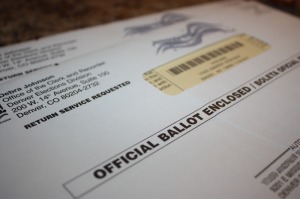Like many bills in the 2019 legislative session, Senate Bill 19-235 is being fast-tracked by Democrat leadership to avoid too much public scrutiny. It was introduced on April 4, and in less than two weeks it will have cleared all Senate committee hurdles and be scheduled for floor debate. That is unless Coloradans wake up and move quickly to tell their legislators to let the bill die.

The first question about SB 235 is, why the hurry? The bill is being fast-tracked not in response to some public emergency or dire need requiring immediate bipartisan action. Colorado already has the second highest voter participation rate in the nation. Why should anybody be forced to register to vote – especially in a state with same-day voter registration? That makes no sense, unless there is some other motive at play.
This bill aims not to improve the efficiency or impact of a government program, but rather put control of the machinery of voter registration on a robotic conveyor belt of continuous, automatic enrollment of demonstrably uninterested voters. Moreover, under Colorado law, once on the rolls they can never be removed for lack of interest: both active and inactive voters will receive a mailed ballot in every election — forever.
Right away, we can hear a Boulder high school civics teacher asking, “What’s wrong with forced automatic voter registration? If we agree voter registration is a good thing, then why not maximize that number, even if there are a few downsides and unintended consequences!” Well, it turns out some of those downsides are well documented and others are obvious when you peel away the radical double speak.
For example, guess what happened when this same plan was enacted in California in 2015. Because of the massive error rates in the data sent to the Secretary of State, California’s Democrat-supermajority legislature has already ordered an independent audit, with results due in May. Since Colorado Democrats are so fond of imitating California, why not put the brakes on SB 235 and wait for those audit results? The bill also removes penalties for non-citizens failing to act to cancel their automated voter registration. Granted, in California that earns a wink not an indictment, but maybe Coloradans will see that differently.
![]() A significant unintended consequence the sponsors have overlooked is this: their plan will actually lower statewide voter participation rates, not improve them. How? In March, there were 173,786 inactive unaffiliated voters among Colorado’s 3.8 million registered voters. Voter participation rates are universally calculated as ballots cast as a percentage of all registered voters. Thus, if SB 235 is successful, it will “automatically” add a hundred thousand or more unaffiliated, unmotivated voters to the rolls. Now, since unaffiliated voters’ participation rate in 2018 was about 10% below the Republican and Democrat rates, and since the participation rate of individuals who have been coerced into voter registration will be predictably lower than other participation rates, the ironic result of the SB 235 plan will be a lower statewide participation rate.
A significant unintended consequence the sponsors have overlooked is this: their plan will actually lower statewide voter participation rates, not improve them. How? In March, there were 173,786 inactive unaffiliated voters among Colorado’s 3.8 million registered voters. Voter participation rates are universally calculated as ballots cast as a percentage of all registered voters. Thus, if SB 235 is successful, it will “automatically” add a hundred thousand or more unaffiliated, unmotivated voters to the rolls. Now, since unaffiliated voters’ participation rate in 2018 was about 10% below the Republican and Democrat rates, and since the participation rate of individuals who have been coerced into voter registration will be predictably lower than other participation rates, the ironic result of the SB 235 plan will be a lower statewide participation rate.
The bill’s Fiscal Note greatly underestimates the likely cost to county clerks of identifying and correcting thousands of errors in the data being transferred.
Let’s look more closely at the main features of this radical makeover of forced voter registration.
- Everyone who has enrolled with certain state agencies, citizen and non-citizen alike, will have their personal data sent to the Colorado Secretary of State unbeknownst to them, who will then send it to the appropriate County Clerk and Recorder, to be entered on the voter registration rolls.
- Individuals then will be sent a notification of this action and will receive an opt-out form, which must be returned within 20 days. If they do not opt out, they will be automatically registered as an unaffiliated voter. Affiliating with a political party takes an extra step.
- The main target for this All Points Bulletin for AWOL voters is the state’s Medicaid enrollment, a list that actually cannot be used because of federal privacy laws. Bill sponsors already know that but try hard to avoid acknowledging it.
Senate Bill 235 is also a frontal attack on the right to privacy. It is another overreach bill in this year’s legislative line up to gin up a government policy without a scintilla of evidence for solving a problem. Moreover, it has a propensity to create massive voter registration errors, drive-up process inefficiencies and increase costs to the state and counties at the expense of Coloradans’ personal freedoms.
Coloradans take their freedoms seriously, which explains the partisan haste with which this unsavory concoction is being pushed across the finish line.
Jan Cook is co-founder of the grassroots political organization Get Er Done Right Colorado on Facebook. Charles Heatherly is former Director of Policy and Strategic Initiatives for the Colorado Senate Republican caucus.


